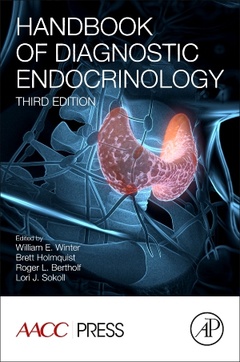Handbook of Diagnostic Endocrinology (3rd Ed.)
Coordonnateurs : Winter E William, Sokoll Lori J., Holmquist Brett, Bertholf Roger L.

Raffick A.R. Bowen, Roger L. Bertholf and Brett Holmquist
2. Laboratory investigation of disorders of the pituitary gland
Verena Gounden, Charlotte C. Ellberg and Ishwarlal Jialal
3. Thyroid disease and laboratory assessment
Sridevi Devaraj and Emily Garnett
4. Disorders of the adrenal gland
Roger L. Bertholf
5. Endocrine disorders of the reproductive system
Angela M. Ferguson and Mark A. Cervinski
6. Gastroenteropancreatic tumors
Neeraj Ramarishnan, Seong Hyun Ahn and Ishwarlal Jialal
7. Evaluation of hypoglycemia
William E. Winter and Neil S. Harris
8. Evaluation of hyperglycemia
William E. Winter, David L. Pittman, Sridevi Devaraj, Danni Li and Neil S. Harris
9. Lipoproteins
Anna Wolska and Alan T. Remaley
10. Disorders of calcium metabolism
William E. Winter and Neil S. Harris
11. Laboratory evaluation of endocrine hypertension
William E. Winter and Neil S. Harris
12. Malignancy-associated endocrine disorders
Lori J. Sokoll and Daniel W. Chan
13. Laboratory assessment of acquired immunodeficiency syndrome endocrinopathies
Verena Gounden and Manisha Chandalia
14. Laboratory evaluation of short stature in children
William E. Winter
15. Pregnancy and the fetus
K. Aaron Geno, Mark A. Cervinski and Robert D. Nerenz
16. Disorders of sexual development
William E. Winter, Paul Hiers and Dina N. Greene
17. Transgender endocrinology
Dina N. Greene, Tamar Reisman and Zil Goldstein
18. The endocrinology of aging
Daniel T. Holmes and Gregory Kline
Lori J. Sokoll, Ph.D., FAACC is Professor of Pathology in the Johns Hopkins University School of Medicine and has secondary appointments in Oncology and Urology. She is Associate Director of the Clinical Chemistry Division and Director of the Special Chemistry Laboratory in the Johns Hopkins Hospital. Her research interests are focused on the evaluation and clinical applications of cancer biomarkers. She is an Associate Editor of the AACC publication Journal of Applied Laboratory Medicine.Lori J. Sokoll, Ph.D., FAACC is Professor of Pathology in the Johns Hopkins University School of Medicine and has secondary appointments in Oncology and Urology. She is Associate Director of the Clinical Chemistry Division and Director of the Special Chemistry Laboratory in the Johns Hopkins Hospital. Her research interests are focused on the evaluation and clinical applications of cancer biomarkers. She is an Associate Editor of the AACC publication Journal of Applied Laboratory Medicine.
Dr Holmquist is board certified by the American Board of Clinical Chemistry, a fellow of the Ameri
- Each chapter focuses on the biochemical tests that are required, either in the basal state or following provocation or suppression, to assist in the diagnosis of the various disorders
- Describes proper sample collection and relevant interpretations of laboratory tests
- Contains essential molecular biology and incorporates it with the clinical information
- Includes the discovery of new diagnostic and treatment methods
Date de parution : 10-2020
Ouvrage de 744 p.
15x22.8 cm
Thèmes de Handbook of Diagnostic Endocrinology :
Mots-clés :
?ACTH; Addison disease; Addisonian crisis; Adrenal cortex; Adrenal gland; Adrenal medulla; Adrenocortical carcinoma; Adrenocorticotropic hormone; Adrenocorticotropic hormone; Age; Aldosterone; Amenorrhea; Analytical error; Anti-Müllerian hormone; Anti-retroviral therapy; Antiaging; Biotin; Calcium metabolism; Carcinoma; Cholesterol; Congenital adrenal hyperplasia; Corticotropin; Cortisol; Cross-reactivity; Cushing disease; Cushing syndrome; DHEA; Deficiency; Disorder of sexual development (DSD); Dyslipidemia; Epinephrine; Erectile dysfunction; Feto-placental unit; Follicle stimulating hormone; Follicle-stimulating hormone; Gastrinoma; Genitalia; Glucagonoma; Growth hormone (GH); Growth velocity; Growth hormone; Guidelines; Gynecomastia; HDL; HIV-related endocrinopathies; Heterophile antibodies; Hirsutism; Human chorionic gonadotropin; Hypercalcemia; Hypergonadotropic hypogonadism; Hyperparathyroidism; Hypogonadotropic hypogonadism; Immunoassay; Infertility; Insulin-like growth factor (IGF); Insulinoma; Karyotype; Klinefelter syndrome; LDL; Lipid panel; Lipids; Lipoproteins; Luteinizing hormone; Malignancy; Matrix effects; Menstrual cycle; Multiple endocrine neoplasia; Mutations; Neuroblastoma; Norepinephrine; Parathyroid; Pathological; Pheochromocytoma; Phosphate; Physiological; Pituitary; Placenta; Polycystic ovarian syndrome; Postanalytical error; Preanalytical error; Predictive value; Pregnancy; Prevention; ROC; Receiver operating characteristic; Reference change value; Reference range; Rheumatoid factor; Sensitivity; Sex steroids; Short stature; Specificity; Testosterone; Thyroid; Triglycerides; Turner syndrome; VIPoma; Vitamin D; X



